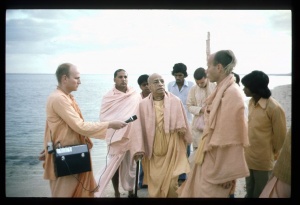SB 10.1.48: Difference between revisions
m (1 revision(s)) |
No edit summary |
||
| Line 1: | Line 1: | ||
{{info | {{info | ||
|speaker= | |speaker=Śukadeva Gosvāmī | ||
|listener=King | |listener=King Parīkṣit | ||
}} | }} | ||
[[Category:Srimad-Bhagavatam - Canto 10 Chapter 01]] | |||
[[Category:Bhagavatam Verses Spoken by Sukadeva Gosvami - Vanisource|100148]] | |||
<div style="float:left">'''[[Srimad-Bhagavatam]] - [[SB 10|Tenth Canto]] - [[SB 10.1: The Advent of Lord Krsna: Introduction|Chapter 1: The Advent of Lord Kṛṣṇa: Introduction]]'''</div> | |||
<div style="float:right">[[File:Go-previous.png|link=SB 10.1.47]] '''[[SB 10.1.47]] - [[SB 10.1.49-50]]''' [[File:Go-next.png|link=SB 10.1.49-50]]</div> | |||
{{RandomImage}} | |||
==== TEXT 48 ==== | ==== TEXT 48 ==== | ||
<div | <div class="verse"> | ||
mṛtyur buddhimatāpohyo | :mṛtyur buddhimatāpohyo | ||
yāvad buddhi-balodayam | :yāvad buddhi-balodayam | ||
yady asau na nivarteta | :yady asau na nivarteta | ||
nāparādho 'sti dehinaḥ | :nāparādho 'sti dehinaḥ | ||
</div> | </div> | ||
| Line 17: | Line 22: | ||
==== SYNONYMS ==== | ==== SYNONYMS ==== | ||
<div | <div class="synonyms"> | ||
''mṛtyuḥ''—death; ''buddhi-matā''—by an intelligent person; ''apohyaḥ''—should be avoided; ''yāvat''—as long as; ''buddhi-bala-udayam''—intelligence and bodily strength are present; ''yadi''—if; ''asau''—that (death); ''na nivarteta''—cannot be checked; ''na''—not; ''aparādhaḥ''—offense; ''asti''—there is; ''dehinaḥ''—of the person in danger of death. | |||
</div> | </div> | ||
| Line 24: | Line 29: | ||
==== TRANSLATION ==== | ==== TRANSLATION ==== | ||
<div | <div class="translation"> | ||
As long as he has intelligence and bodily strength, an intelligent person must try to avoid death. This is the duty of every embodied person. But if death cannot be avoided in spite of one's endeavors, a person facing death commits no offense. | As long as he has intelligence and bodily strength, an intelligent person must try to avoid death. This is the duty of every embodied person. But if death cannot be avoided in spite of one's endeavors, a person facing death commits no offense. | ||
</div> | </div> | ||
| Line 31: | Line 36: | ||
==== PURPORT ==== | ==== PURPORT ==== | ||
<div | <div class="purport"> | ||
It is natural for a person facing untimely death to try his best to save himself. This is one's duty. Although death is sure, everyone should try to avoid it and not meet death without opposition because every living soul is by nature eternal. Because death is a punishment imposed in the condemned life of material existence, the Vedic culture is based on avoiding death (tyaktvā dehaṁ punar janma naiti ([[BG 4.9]])). Everyone should try to avoid death and rebirth by cultivating spiritual life and should not submit to death without struggling to survive. One who is not trying to stop death is not an intelligent human being. Because Devakī was face to face with imminent death, it was Vasudeva's duty to save her, as he was trying his best to do. He therefore considered another way to approach Kaṁsa so that Devakī would be saved. | It is natural for a person facing untimely death to try his best to save himself. This is one's duty. Although death is sure, everyone should try to avoid it and not meet death without opposition because every living soul is by nature eternal. Because death is a punishment imposed in the condemned life of material existence, the Vedic culture is based on avoiding death (''tyaktvā dehaṁ punar janma naiti'' ([[BG 4.9 (1972)|BG 4.9]])). Everyone should try to avoid death and rebirth by cultivating spiritual life and should not submit to death without struggling to survive. One who is not trying to stop death is not an intelligent human being. Because Devakī was face to face with imminent death, it was Vasudeva's duty to save her, as he was trying his best to do. He therefore considered another way to approach Kaṁsa so that Devakī would be saved. | ||
</div> | </div> | ||
__NOTOC__ | |||
<div style="float:right; clear:both;">[[File:Go-previous.png|link=SB 10.1.47]] '''[[SB 10.1.47]] - [[SB 10.1.49-50]]''' [[File:Go-next.png|link=SB 10.1.49-50]]</div> | |||
__NOTOC__ | |||
__NOEDITSECTION__ | |||
Revision as of 04:42, 18 May 2021

A.C. Bhaktivedanta Swami Prabhupada
TEXT 48
- mṛtyur buddhimatāpohyo
- yāvad buddhi-balodayam
- yady asau na nivarteta
- nāparādho 'sti dehinaḥ
SYNONYMS
mṛtyuḥ—death; buddhi-matā—by an intelligent person; apohyaḥ—should be avoided; yāvat—as long as; buddhi-bala-udayam—intelligence and bodily strength are present; yadi—if; asau—that (death); na nivarteta—cannot be checked; na—not; aparādhaḥ—offense; asti—there is; dehinaḥ—of the person in danger of death.
TRANSLATION
As long as he has intelligence and bodily strength, an intelligent person must try to avoid death. This is the duty of every embodied person. But if death cannot be avoided in spite of one's endeavors, a person facing death commits no offense.
PURPORT
It is natural for a person facing untimely death to try his best to save himself. This is one's duty. Although death is sure, everyone should try to avoid it and not meet death without opposition because every living soul is by nature eternal. Because death is a punishment imposed in the condemned life of material existence, the Vedic culture is based on avoiding death (tyaktvā dehaṁ punar janma naiti (BG 4.9)). Everyone should try to avoid death and rebirth by cultivating spiritual life and should not submit to death without struggling to survive. One who is not trying to stop death is not an intelligent human being. Because Devakī was face to face with imminent death, it was Vasudeva's duty to save her, as he was trying his best to do. He therefore considered another way to approach Kaṁsa so that Devakī would be saved.